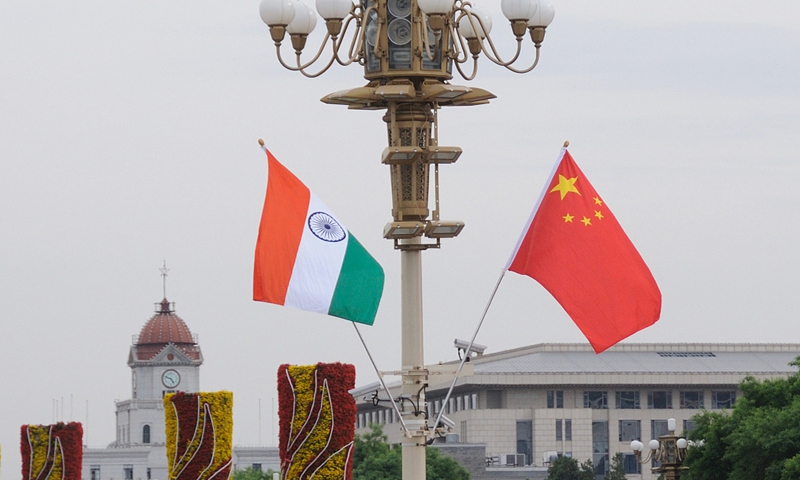Indian netizens easily inflamed by nationalism turn extreme amid border tensions
By Huang Lanlan and Xie Wenting Source:Global Times Published: 2020/6/19 16:39:12

Photo: VCG
China-related hashtags and posts are trending on India's social media amid border tensions, with numerous posts containing insulting remarks and unsightly pictures reflecting negatively on China.
"If I [had a] gun I [would] kill at least 100 Chinese soldiers before I die," read one post from an Indian netizen on Twitter.
Another net user wrote that they would "destroy" China with atom and hydrogen bombs.
Such anti-China provocation has led to a "boycott China" campaign on social media among Indian users, with some celebrities openly calling for Indians to reject "made-in-China" products.
On Twitter, Indian Union Minister Ramdas Athawale appealed on Wednesday for a boycott of "Chinese food and restaurants." Cricketer Harbhajan Singh called to "ban all Chinese product" the previous day. Earlier, engineer and educator Sonam Wangchuk, the inspiration of a main character in Bollywood blockbuster 3 Idiots, called on Indian smartphone users to uninstall Chinese mobile apps.
It is strange that certain Indian opinion leaders are focusing more on a boycott of Chinese products than on India's COVID-19 outbreak, which has seen tens of thousands infected across the nation, Wang Dehua, advisor of the Chinese Association for South Asian Studies and research fellow at the Shanghai Municipal Center for International Studies told the Global Times.
India has reported 366,946 confirmed COVID-19 cases as of Thursday morning, ranking fourth globally, according to statistics released on the website of India's health authority.
"They are trying to divert domestic attention from their failures in controlling the pandemic to something else," he added.
Lau, a Chinese communications equipment exporter living in the Philippines, said almost half of his clients are from India. He told the Global Times that he is angered by Indians' unfriendly Twitter posts targeting China, and said there is an "obvious growth" in the number of such posts.
Lau said that based on his observations, Indian netizens - especially younger ones - are easily inflamed by nationalism, which makes them extreme and irrational.
"Some of them even said on social media that the more Chinese people die, the happier they are," Lau told the Global Times Friday. "That's terrible."
Contrary to irrational Indian netizens, many Chinese netizens have taken to China's Twitter-like Sina Weibo to call for peace and restraint.
Long Xingchun, a senior research fellow at the Academy of Regional and Global Governance under the Beijing Foreign Studies University and president of the Chengdu Institute of World Affairs, told the Global Times that strong anti-China sentiment among ordinary Indian people is the result of propaganda from local news outlets, aggressive nationalists and even some scholars.
Some Indian policymakers and think tanks have been working together to orchestrate a wave of anti-China sentiment, and they view China and Sino-Indian relations through a US-biased lens, said Long.
Xiao Jun, a Chinese observer who has lived in India for a few years, told the Global Times that anti-China forces in India can normally be divided into four groups. The first are the "diehards" who see China as a hostile power.
They are often deeply affected by the Sino-Indian war of 1962, in which some of their loved ones were killed.
The second are the ultranationalists, who have lobbied against Chinese goods like Huawei's technology. These extreme nationalists are not only against China, but against any country they see as hurting their national pride.
The third are anti-China politicians, who use anti-China sentiment as a stepping stone for their career paths. The fourth are India's intellectuals and middle class who are sometimes obsessed with and often blindly obey Western values, Xiao said.
Posted in: DIPLOMACY,CHINA-INDIA